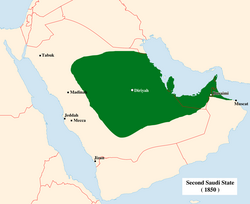|

Although the region in which the country stands today
has an ancient history, the emergence of the Saudi dynasty
began in central Arabia in 1744. That year, Muhammad ibn
Saud, the ruler of the town of Ad-Dir'iyyah near Riyadh,
joined forces with a well-known Islamic scholar and Imam,
Muhammad ibn Abd-al-Wahhab, to create a new political and
religious entity. Both persons found they had common
interests, mainly to see all the Arabs of the peninsula
brought back to "true" Islam. This alliance
formed in the 18th century remains the basis of Saudi
Arabian dynastic rule today, and over the next 150 years,
the fortunes of the Saud family rose and fell several
times as Saudi rulers contended with Egypt, the Ottoman
Empire, and other Arabian families for control of the
peninsula (see First Saudi State and Second Saudi State).
The third and current Saudi state was founded in the early
20th century by King Abdul Aziz Al Saud (known
internationally as Abdul Aziz Ibn Saud).

First Saudi State (1744–1818)
First
Saudi State (1744–1818)
The first Saudi State was established in 1744
when Muhammad ibn Abd-al-Wahhab settled in Diriyah and
Prince Muhammed Ibn Saud agreed to support and espouse his
cause in the hope of cleansing Islamic practices of
heresy. The House of Saud and its allies rose to become
the dominant state in Arabia controlling most of the
present-day territory of Saudi Arabia, including the
Islamic holy cities of Mecca and Medina. Concerned at the
growing power of the Saudis, the Ottoman Sultan instructed
Mohammed Ali Pasha to reconquer the area again. Ali sent
his sons Tusun Pasha and Ibrahim Pasha who were successful
in routing the Saudi forces in 1818, eventually weakening
the hold of Al Saud. Alshuraim was one of the largest
families that supported king Abdulaziz and his family.

Second Saudi State (1824–1891)
Second
Saudi State (1824–1891)
After a rebuilding period following the ending of the
First Saudi State, the House of Saud returned to power in
the Second Saudi State in 1824. The state lasted
until 1891 when it succumbed to the Al Rashid of Ha'il.
1891
to present day

Third Saudi State (present day) (Saudi Arabia)
Rashidi Arabia endured from 1891 to 1902, when Ibn Saud
reconquered Riyadh, the first of a series of conquests
leading to the creation of the modern nation state of
Saudi Arabia in 1932. The Third Saudi state was founded by
the late King Ibn Saud of Saudi Arabia. In 1902 Ibn Saud
captured Riyadh, the Al-Saud dynasty's ancestral capital,
from the rival Al-Rashid family. Continuing his conquests,
Abdul Aziz subdued Al-Hasa, the rest of Nejd, and the
Hejaz between 1913 and 1926. Boundaries with Jordan, Iraq,
and Kuwait were established by a series of treaties
negotiated in the 1920s, with two "neutral
zones" created, one with Iraq and the other with
Kuwait. On January 8, 1926 Hussain Ibn Ali became the King
of Sharqiya. On January 27, 1927 he took the title King of
Nejd (his previous Nejdi title was Sultan). By the Treaty
of Jeddah, signed on May 20, 1927, the United Kingdom
recognized the independence of Abdul Aziz's realm (then
known as the Kingdom of Hejaz and Nejd). In 1932, these
regions were unified as the Kingdom of Saudi Arabia. The
discovery of oil on March 3, 1938 transformed the country.
The country's southern boundary with Yemen was partially
defined by the 1934 Treaty of Taif, which ended a brief
border war between the two states.
Abdul Aziz's military and political successes were not
mirrored economically until vast reserves of oil were
discovered in March 1938. Development programs, which were
delayed due to the onset of the Second World War in 1939,
began in earnest in 1946 and by 1949 production was in
full swing. Oil has provided Saudi Arabia with economic
prosperity and a great deal of political leverage in the
international community. Prior to his death in 1953, Abdul
Aziz, aware of the difficulties facing other regional
absolute rulers reliant on extended family networks,
attempted to regulate the succession.
Saud succeeded to the throne on his father's death in
1953. However, by the early 1960s the Kingdom was in
jeopardy due to Saud's economic mismanagement and failure
to deal effectively with a regional challenge from
Egyptian president Gamal Abdel Nasser. As a consequence,
Saud was deposed in favor of Faisal in 1964. Intra-family
rivalry, echoed by increasing complications from the 1973
oil crisis, was one of the factors that led to the
assassination of Faisal by his nephew, Prince Faisal bin
Musa'id, in 1975. He was succeeded by King Khalid until
1982 and then by King Fahd. When Fahd died in 2005, his
half-brother, Abdullah, ascended to the throne.
|











